(MENAFN- Asia Times) Myanmar's military junta reckons it has a way out of the turmoil and war it unleashed after staging a democracy-killing coup two years ago. Despite sparking a nationwide uprising that has left an estimated 2,900 civilians dead and hundreds of thousands displaced, the junta plans to hold elections this year in a cynical ploy to maintain power while claiming to restore peace.
No one outside of Naypyidaw believes the polls will offer a fair account of national sentiment nor be conducted freely, but there is rising speculation that Myanmar's neighbors in Southeast Asia might tactically accept the results as legitimate in order to get the Myanmar crisis off the regional agenda.
“As far as I know there is no ASEAN policy on [the] elections. What we see is that some ASEAN states see elections as an off-ramp whilst others are skeptical,” a foreign diplomat told Asia Times.
Most analysts, however, are confident that regardless of how ASEAN reacts, Western democracies won't budge on their sanctions against junta officials and associated businesses and will condemn the junta's election as illegitimate and a sham.
“There is simply no question of the British government accepting whatever regime which follows any military-organized elections as legitimately representing the will of the people,” Mark Farmaner, director of Burma Campaign UK, a lobbying group, said.
Britain, Myanmar's former colonial ruler, has recently upped its engagement with Myanmar's anti-junta shadow government, the National Unity Government (NUG), as have other Western capitals. Zin Mar Aung, the NUG's foreign minister, met with several British politicians and officials on her trip to London earlier this month.
The European Union (EU), which has now imposed five rounds of sanctions on junta officials and their business interests, is likely to be equally resolved that the elections won't change the picture.
“The conditions to hold a transparent, inclusive and credible election in 2023 as announced by the junta are unlikely to be met in the present circumstances,” Peter Stano, an EU spokesperson, told Asia Times.
“The EU is committed to bring back Myanmar on a democratic path. Holding elections under the conditions currently set by the junta could only lead to more violence and instability in the country and the region,” he added.
Heidi Hautala, a vice president of the European Parliament, said it would be“complete anathema for the EU to provide any legitimacy to this bogus electoral exercise.” She also expected ASEAN leaders to make it clear to the junta“that this false exercise has no legitimacy in the eyes of the international community.”
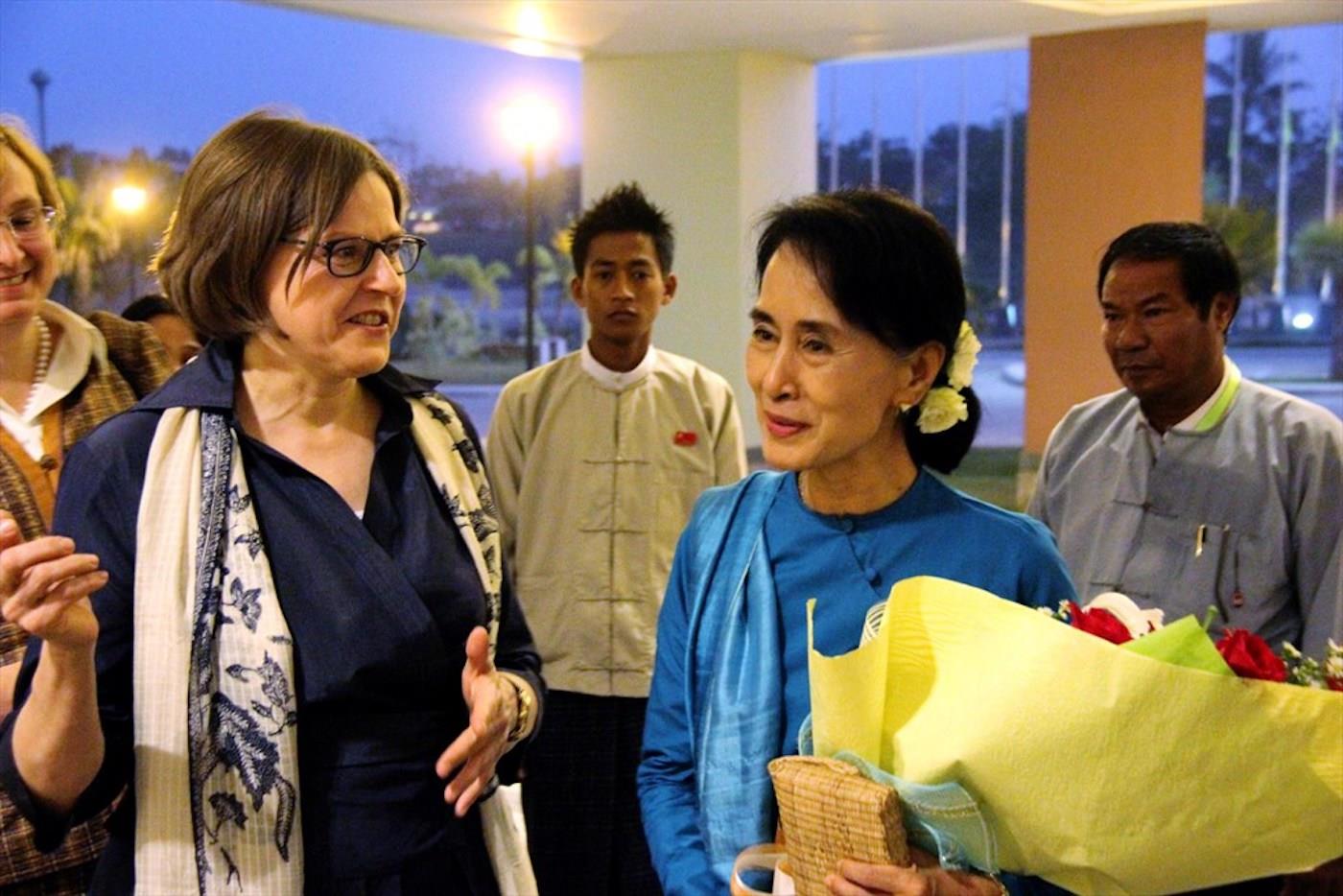
EU Vice President Heidi Hautala and now jailed democratic leader Aung San Suu Kyi in a file photo. Image: Facebook
Asia Times understands that there have not yet been any formal discussions within the EU about what to do if ASEAN accepts the junta's elections as legitimate.
The United States is also expected to be unmoved by ASEAN's response. Scot Marciel, a former US ambassador to Myanmar, said he fully expects the United States to“oppose the elections as not credible or legitimate, even if ASEAN does otherwise.”
In December, the US Senate included a stripped-down version of the burma act , the Burma Unified Through Rigorous Military Accountability Act of 2021, in a piece of military spending authorization legislation. This increases the scope for the US government to sanction junta-aligned individuals and businesses, and to support rebel groups.
Although it doesn't say anything explicit about the planned elections by the State Administration Council (SAC), the junta's official moniker, it does state that US policy is“to assist in the establishment of a fully democratic, civilian-led, inclusive, and representative political system that includes free, fair, credible, and democratic elections in which all people of Burma, including all ethnic and religious minorities, can participate in the political process at all levels including the right to vote and to run for elected office.”
Washington is very unlikely to see the SAC ballot as fitting that bill. And the BURMA Act is explicit about the nature of elections being carried out in a reputable fashion. Amid the“early sunset” clauses, which define what the law can cease to have an effect, conditions include once“the elected government has been reinstated,” meaning the deposed National League for Democracy-led administration,“or new free and fair elections have been held.”
Tom Andrews, the independent UN special investigator on Myanmar, called on all countries to reject the illegal and“farcical” election in a report to the Human Rights Council on January 31. UN members, he said at a press conference,“have an important responsibility and role to play in determining whether Myanmar's military junta will succeed in achieving its goal of being accepted as legitimate and gaining control of a nation in revolt.”
There's mounting doubt about how Southeast Asian governments will respond, though. Retno Marsudi, the foreign minister of Indonesia, this year's ASEAN chair, still appears invested in the Five-Point Consensus that the bloc agreed with the junta months after its coup but which the military regime has failed to abide by.
Although Indonesia has vowed to take a more disciplinarian stance on the junta than its two predecessors in the ASEAN chair, Brunei and Cambodia, it appears to be struggling to gain any consensus among the bloc's other nine members. ASEAN has a strict policy of not interfering in the domestic affairs of another member, while broadly the bloc is not a bastion of democracy.
Thailand is still governed by the general who led its own military coup in 2014, while one-party Laos and Vietnam, and authoritarian Cambodia, are more focused on ASEAN being a vehicle for the region's economic development.
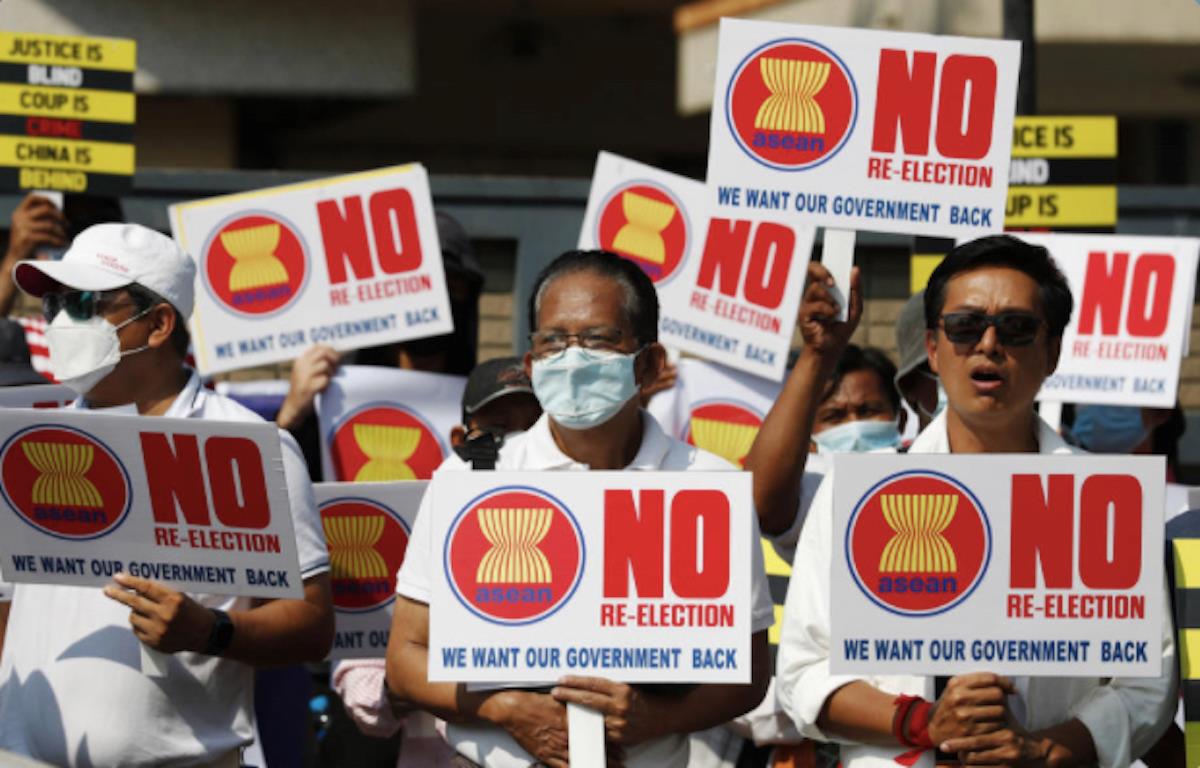
Myanmar protesters carry signs calling on ASEAN not to endorse the junta's election plan. Picture: APHR
Charles Santiago, from the ASEAN Parliamentarians for Human Rights group, recently suggested that Thailand, Cambodia and Laos would support any result of the junta-led election that legitimizes the military. Vietnam, which has been mostly silent on the conflict for two years, would likely fall into that category, too. Brunei's stance is unclear, analysts say.
That leaves Indonesia, Malaysia, Singapore and the Philippines.“I hope Indonesia takes the lead and ensures that there's no consensus on this, but the reality is that Malaysia is no longer as forceful a champion, and the business community in Singapore is itching to get back to Myanmar,” Zachary Abuza, a professor at the National War College in Washington DC, said.
But Gregory Poling, director of the Southeast Asia Program at the Center for Strategic and International Studies, a Washngton-based think tank, reckons there is little chance of those same four Southeast Asian states recognizing such an election,“and certainly not all of them, which means there would be no consensus within ASEAN.”
Around two-fifths of Southeast Asian“elites” think the Five-Point Consensus is either a flawed plan or won't work, according to a survey published last week by the ISEAS–Yusof Ishak Institute in Singapore. More than 15% of“elites” think ASEAN should not interfere in the Myanmar crisis, up from 8.4% last year, although most want the bloc to engage with all stakeholders including the NUG.
Nonetheless, ASEAN has seemingly left the door open for outside governments to chart their own path on Myanmar. At an ASEAN summit last November, the region's leader issued a two-page update to discussions on the Five-Point Consensus. Beyond the usual diplomatic bumf were paragraphs 13 and 14.
“ASEAN is to call the UN and our external partners to support us in our efforts in the implementation of the Five-Point Consensus,” read the former, while the latter added that“ASEAN shall consider exploring other approaches that could support the implementation of the Five-Point Consensus.”
According to Moe Thuzar, a fellow and acting coordinator of the ISEAS–Yusof Ishak Institute's Myanmar Studies Program, that indicates“there is room for ASEAN's Dialogue Partners like the US and EU to pursue their policies on Myanmar, while at the same time engaging with ASEAN on where and how a multi-pronged approach might have traction.”
What their own policies might look like is another matter, since most analysts reckon Western capitals have almost no interest in greater intervention, not least because none wants to become bogged down in a conflict that could last years.
The most they would be willing to do, some pundits think, would be to offer more recognition to the shadow NUG, which may include additional funding for resistance and humanitarian efforts.“The EU should acknowledge and firmly stand by the National Unity Government as the sole legitimate representative of the democratic wishes of the people of Myanmar,” Hautala, the European Parliament vice president, told Asia Times.
Foreign diplomats want to see a significant demonstration from the NUG that it can command the allegiance of the disparate resistance movement, a prerequisite for them to offer the shadow government more recognition and support.
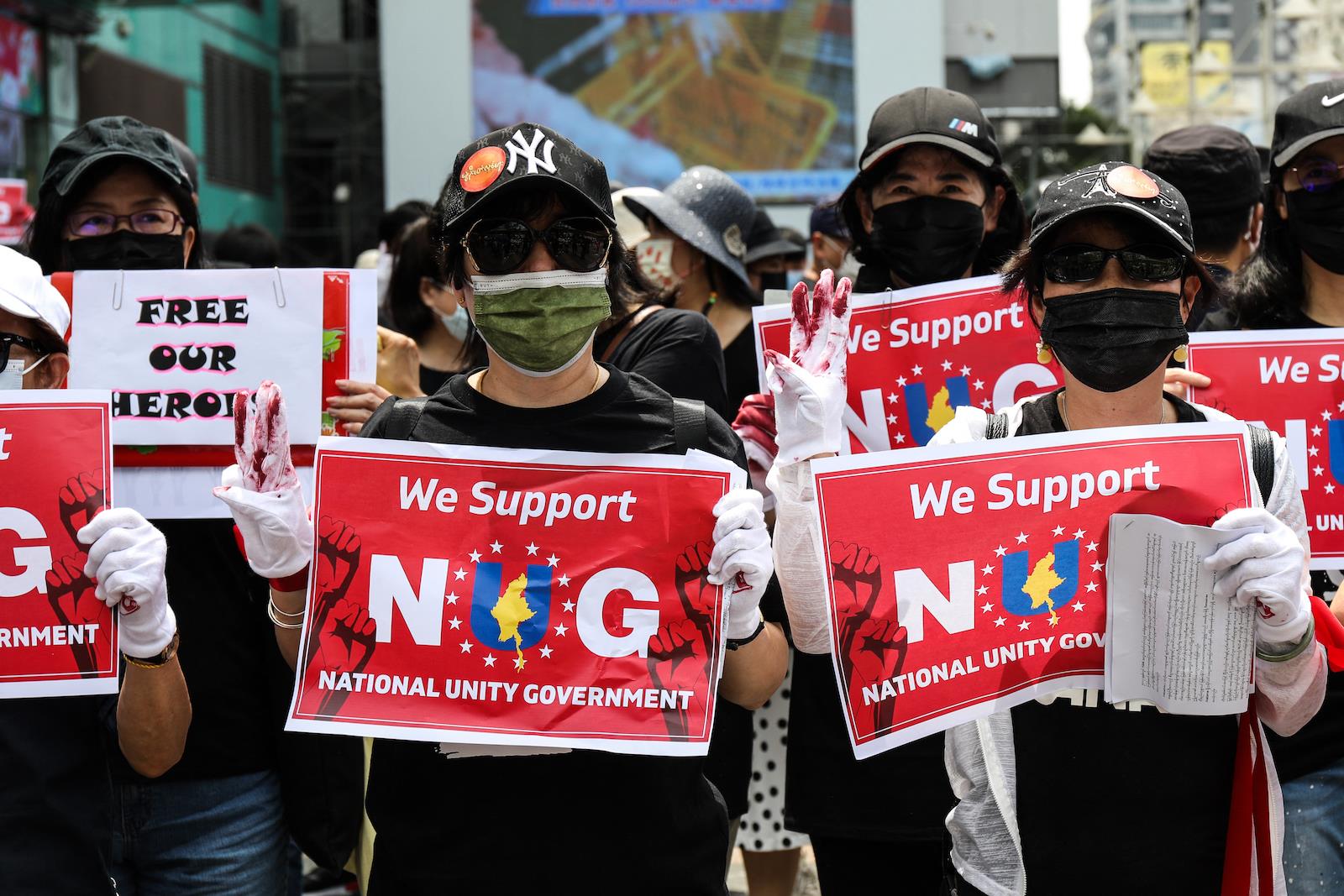
Anti-coup protesters show their support for Myanmar's National Unity Government. Photo: Jose Lopes Amaral / NurPhoto via AFP
“Sympathetic governments are looking to the National Unity Government to create a clear alternative to the military election agenda, which means making the concessions on federalism necessary to bring ethnic armed organizations and ethnic political parties and civil society on board to create a unified front,” said Farmaner of Burma Campaign UK. “This hasn't happened yet.”
But there are still niggling fears that Western democracies might blush if ASEAN changes its tune about Myanmar after the junta's inevitably rigged election. Indeed, some analysts sense an early wobble from Washington.
A US government statement on the coup's second anniversary on February 1 said that“the United States will continue to support the pro-democracy movement and its efforts to advance peace and multiparty governance in Burma. We commend those working to strengthen unity and cohesion among diverse groups who share a vision of a genuine and inclusive democracy in Burma.”
But at least one source said it was noticeable that the statement didn't mention the NUG or the ousted NLD by name.
Washington is also in certain hot water after Human Rights Watch revealed that last year the US Treasury Department approved million-dollar payments from Japanese firm Yokogawa Bridge to the Myanmar Economic Corporation, a Myanmar military conglomerate that is under US sanctions.
And the US courted controversy after media revealed that the junta's defense ministry was invited to take part in the ASEAN Defence Ministers' Meeting (ADMM)-Plus Experts' Working Group on Maritime Security,“a regional military meeting and table-top exercise” that the US will co-host next month.
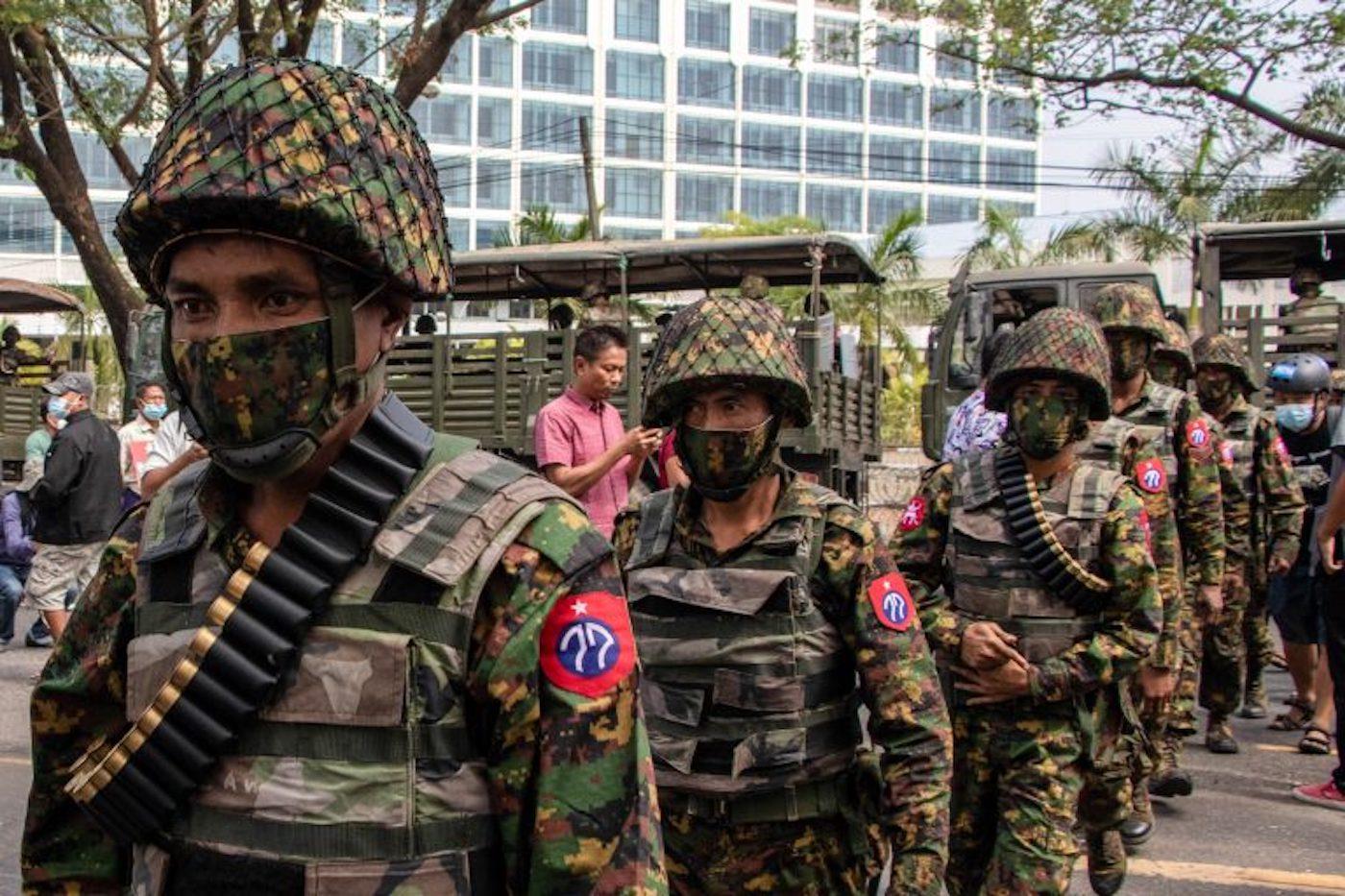
Myanmar's military regime is looking for legitimacy. Image: Twitter
“Given that this is a high-level invitation intended for regional security partners, the US is not only providing a veil of legitimacy to the Myanmar military and its brutal actions but also oiling the gears of the military's killing machine,” Me Me Khant, an activist and co-founder of Students for Free Burma, wrote in the Diplomat earlier this month.
After the junta's defense ministry was invited to participate in next month's US co-hosted security exercise, Washington seemingly moved responsibility for the invite onto the ASEAN Secretariat.
“Attendance at ASEAN forums is determined by ASEAN member states,” Lieutenant Colonel Martin Meiners, a spokesperson for the US Department of Defense, told reporters at a press conference. Yet, according to Me Me Khant, the analyst,“hiding behind ASEAN to avoid taking any strong measures has been a hallmark of the US-Myanmar policy since the coup.”
Follow David Hutt on Twitter at @davidhuttjourno



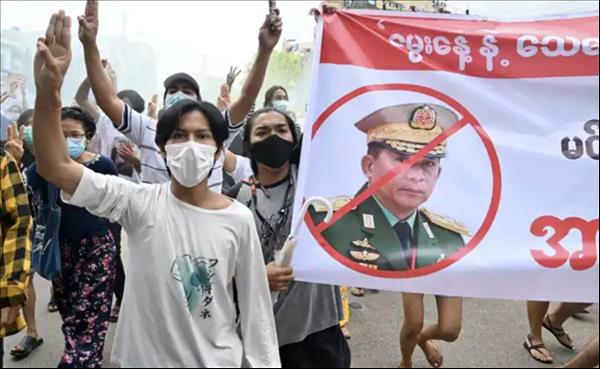



















Comments
No comment